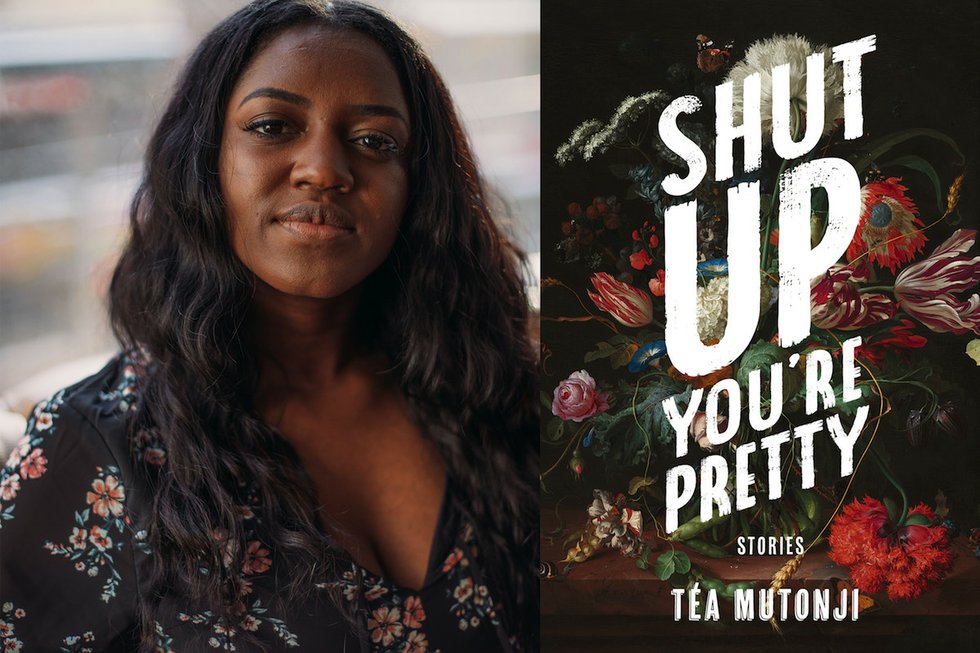
SHUT UP YOURE PRETTY and VS. imprint launch with Vivek Shraya and Ness Lee at Innis Town Hall (2 Sussex). Friday (May 10), 7 pm. Free. anotherstory.ca.
Tea Mutonjis debut book, Shut Up Youre Pretty, is a collection of fictional short stories about the experiences of Loli, a young Black woman, between the ages of six and 26.
Concise yet descriptive, it captures a range of intimate feelings without over-explaining and is some of the best writing I have read about teenage girlhood and friendship, migration, family dynamics, sex and coming of age. Without coming out or expressing desire, protagonist Lolis queerness comes through in her thoughts and interactions with her best friends, Jolie and Olivia. Its a refreshing approach that stands out among the crowd of young, queer and out characters that are increasingly prevalent in fiction and pop culture.
This collection is also the first book to be released on VS. Books, Vivek Shrayas imprint through Arsenal Pulp Press. Mutonji, who also writes poetry and non-fiction, was Shrayas 2017 mentee through her program for 18-to-28-year-old BIPOCs in Canada. Ahead of her Toronto book launch, we discussed the difference between her real life and that of Loli, writing styles and mentorship.
Your stories are short yet complete with well-fleshed-out characters. How do you know when youre done writing?
For this collection, I had written a timeline from the age of six to 26. Most of the time, I knew a story was over once I had nothing else to contribute to that specific age, scene or moment. I always know where I want the story to end, though I dont always know how. Once Im there, its usually a very natural parting for me. It was important to me that the life of the characters continued beyond their given text. In some ways, I left all my endings slightly inconclusive to give that dreamy to be continued effect you get from watching a TV series.
Loli, your protagonist, is self-confident and aware, even when gaining worth through sex and relationships. Do you think her confidence derives from proximity to and friendship with Jolie, the neighbourhoods popular white girl?
I think her confidence is mostly performative. At least, thats how I read her now. Perhaps while writing this I wanted to believe she was a confident person. But I think shes more of a sponge. Shes more of a placeholder for herself. Then yes, her confidence might derive from her friendship with Jolie, and later, from her friendship with Olivia.
Scarboroughs Galloway neighbourhood raised Loli and delivered her to the world. In real life it has a bad reputation to those outside of it. Did you consciously choose to write about it positively for that reason?
I was only on Galloway from age nine to 13, but I wrote [about it] this way because I was interested in how poorly people spoke about it when I moved back to Scarborough after living in a white, quiet area of Oshawa. I would tell people I lived on Galloway with pride and excitement and they would look at me with pity. I combined my own memories of Galloway with my mothers, and conversations with friends still living or working there to depict a Galloway that feels and is real.
Your writing is very matter-of-fact: migration, family fractures, death and longing are implied rather than described with detailed explanations of trauma and pain. How did you arrive at this poignant style?
I played these stories in my head cinematically and I wanted to focus on one full scene per story. I wrote them with the intention to one day put it in a script. And in script writing, you want to withhold any and all fluff. But I write pretty observantly by nature. My relationship with writing has always been the same as a photographers relationship with frames. I try to capture a picture in its real form without my own personal interpretation of it. The challenge in writing these stories was actually withholding my own relationship with some of these themes.
Your ability to show emotion without saying much is a strength to this collection. Is English your first language?
English is my third language, and I do believe that limits my vocabulary. I work with what Ive got. I think differently in French than in English. I am naturally poetic in French, and strict in English. French is the most beautiful language. And perhaps Spanish, too. Im slightly biased.
What was the mentorship process with Vivek Shraya like?
Being mentored by Vivek was the best experience ever. We understand each others work really personally, and that made for a great foundation. Vivek helped me get that style of short, consistent sentences and stories. Shes very patient, but the best part of this whole experience was watching her grow as an artist separately from our work together. I admire her quite a lot, and she makes the impossible feel possible.
Can you tell us about any forthcoming projects?
I have a few things on the go. Myself, Adrian De Leon (Rouge, 2018) and Natasha Ramoutar (Bittersweet, 2020) are working on an anthology of Scarborough writing. Were so excited to get more of Scarborough literature out in the world! I am working on a novel thats close to my heart. It feels a lot more personal than the collection, though I dont explore nearly as many themes.












